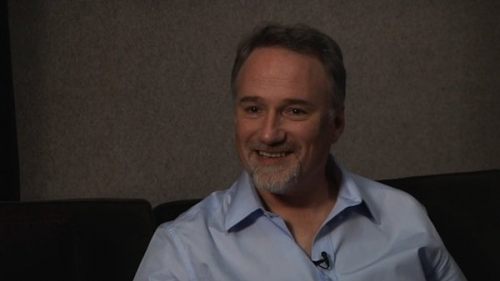Austin Film Fest Review: DARKEST HOUR May Be Gary Oldman’s Finest
Though Christopher Nolan's time-crunching war epic Dunkirk was (appropriately) a fascination for many cinephiles earlier this year, it's worth noting that director Joe Wright had already delivered a rather stunning take on the pivotal WWII evacuation of his own (via a five-minute tracking shot in his 2007 romantic melodrama, Atonement). Now, Wright has returned to give us the flipside to his dynamic recreation of Britain's triumphant escape from the clutches of Adolf Hitler with Darkest Hour - another visually arresting historical drama that documents Winston Churchill's earliest days as Prime Minister. However, the flashiest element of Wright's latest isn't the director's usual flair, but instead Gary Oldman's central performance, in which he all but disappears inside the boozy, blustery politician, crafting what may be the finest character in an already storied career.
Now, this isn't an attempt to discount Wright's efforts behind the camera. Quite the contrary, actually. Because no matter how stuffy the material may be, Wright has a knack for finding a distinct rhythm that's utterly hypnotic, his camera hanging from a God's Eye View over the House of Commons, or fluidly gliding through Britain's cramped corridors of power. Darkest Hour may be the most restrained movie of Wright's career, but there are still moments of visual ostentatiousness that're truly remarkable (a transition from a battlefield that morphs into a dead soldier's face is borderline psychedelic). It's just that he uses these instances of showiness to break up the relentless barrage of talky, backroom politics, which are captured with shadowy aplomb by cinematographer Bruno Delbonnel (Inside Llewyn Davis).
Nevertheless, no matter how painterly each frame is composed, this is still very much Oldman's show, as nearly every scene lives and dies on the merits of his rather bombastic turn. If Dunkirk and Atonement showed us the chaos that occured on the beach, Darkest Hour is all about the tumultuous fight that occured between Churchill and his rivals - an ousted Neville Chamberlain (Ronald Pickup, filling in for a sadly passed John Hurt) and the devious Viscount Halifax (Stephen Dillane) - who are positioning the new Prime Minister to fail by pushing peace talks with the Führer on him (and quietly promising their resignation to each other should he reject them). Meanwhile, King George VI (Ben Mendelsohn) worries about evacuating to Canada, as his new leader's unpredictable (not to mention drunken) nature legitimately frightens him. Oldman's Churchill is a warrior, surrounded by enemies on his own turf, and the actor's eyes (which are his only recognizable feature) constantly scan each room as if simultaneously searching for an exit and his potential political assassin.
There's a marvelous balancing act going on in Anthony McCarten's script, as the writer conveys the severity of this moment in history, while also injecting a playful amount of fun into Wright's picture (believe it or not). The best comparison point would probably be the "walk-and-talk" tête-à-têtes of Aaron Sorkin's cloakroom political works (think: The West Wing, but with Downton Abbey's stuffy "correctness" standing in for that scribe's trademark smarm). McCarten introduces numerous characters - such as Lily James' fresh personal assistant, and Kristin Scott Thomas' rather wonderful take on Churchill's inspiring wife, Clementine - who help us see the man behind the Minister. With them, he's often just as naked and intimidated by his position in the world as anyone else - a fiercely independent individual trying to navigate his way through one of the world's most troubled periods, while also not allowing it to transform him into another cruel tyrant.
Yet it all ultimately comes back to Oldman, who gifts audiences with a performance that is unlike anyting he's done before. Though Winston Churchill is an iconic figure (and viewers will probably be mouthing along to his famous speeches when the actor is called upon to deliver them), and Kazuhiro Tsuji's prosthetic work ensures that we see every lumpy crevice on the man's face, Oldman never slips into mere impersonation. When his Churchill erupts in anger, we hear the performer's voice crack, and the cadence of his speech - often rooted in repetition and a poet's sense of consideration - become singularly personified. We've seen many other thespians try and pull off their own iteration (including Brian Cox earlier this year in Churchill), but this is the first time Winston's ever felt truly alive on screen. It's a towering accomplishment, and almost surely going to net the beloved character actor his first Oscar win.
The greatest moment in Darkest Hour is also its corniest, as McCarten constructs a scene where Churchill takes the Underground and interacts with a collection of common people (attempting to take their pulse when it comes to WWII) that feels downright Capra-esque. But this is also what makes Wright's movie fairly special - it's unafraid to indulge in cinema's ability to create these fantastical scenarios. One look at Chuchill's policies lets you know that he's nowhere near progressive enough to pull off the kind of "everyman" chumminess (finishing a black passenger's Shakespeare quotation, for example) that occurs in this moment. Yet this revisionism allows Darkest Hour to convey a hopeful message that was more impactful than any of the Prime Minister's initial lies preceding Operation Dynamo, and combines with Oldman's dynamite performance, allowing us to comprehend the humanity of a great political mind, however fictionalized it may be.



